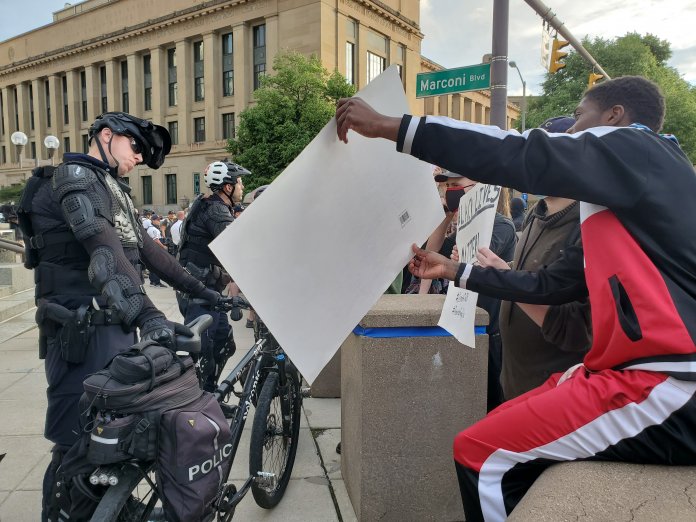Protests have consumed U.S. cities since a black man died May 25 after Minneapolis police knelt on his neck for almost nine minutes. And brutal police conduct in the ensuing protests have raised further questions about the training American officers receive before they’re given a gun, a badge and sweeping power over people.
Gov. Mike DeWine said as much last week when he said that Ohio police need more training in how to properly use force and in methods of de-escalating confrontations.
So it might seem like an especially bad time for the Attorney General Dave Yost to eliminate 27 people whose job it is to train cops across Ohio.
“How ironic that at the very same time an incident exemplifying the need for advanced police training occurs is also the exact same time that in Ohio the entire law enforcement advanced training instructional staff is abolished?” the Fraternal Order of Police’s Ohio Labor Council, which represents Ohio officers, said in a May 29 Facebook Post.
Gwen Callender, the group’s executive director, said the cuts were announced in the most abrupt way just three days before George Floyd was killed in Minneapolis.
“They were basically given their pink slips over a Zoom meeting,” Callender said in an interview last week.
She added that the events of subsequent days illustrated the essential nature of the jobs that were eliminated.
“These people who taught these classes at (the Ohio Peace Officers Training Academy) were professional instructors for law enforcement,” Callendar said. “So if there is going to be a shift in the training in response to what is going on and what happened in Minneapolis — and there probably needs to be a shift in what the curriculum is — these folks are trained instructors. They don’t write the curriculum; they teach the curriculum.”
However, the attorney general’s office said that dwindling finances and class sizes are what led to the cuts. Now Yost wants to “completely restructure” the peace officer training academy, Bethany McCorkle, Yost’s communications director, said on Friday.
“What we heard in surveys of law enforcement — and this all started before COVID — was that law enforcement wants to be trained by subject-matter experts,” McCorkle said. “So a forensic investigator wants to be trained by somebody who has years of experience, who is familiar with the latest and greatest technology, versus someone who has been teaching the same classes for years.”
McCorkle said that the sizes of some academy classes, which were taught at centers in Richfield and London, had dwindled to five, making them less than cost effective. Also, she said, the academy has been funded by casino revenue, which was dwindling before the coronavirus hit and dried up when it did.
In addition, McCorkle said, the restructuring creates an opportunity to adjust police training to meet the demands of the moment.
“Some people would say it’s bad timing with the reality of what’s going on,” she said. “But this gives us an opportunity to talk to the community and officers about what’s the best training — where do we need to be focusing our attention?”
Callender, of the Fraternal Order of Police, questioned why her organization’s professional trainers couldn’t play a role in that process.
In the wake of Floyd’s death, much attention has been focused on police unions and the role they play in officer discipline. Critics say too many unions automatically spring to defense of officers, no matter how indefensible their conduct, and their contracts insulate officers from accountability.
Callendar said her organization does not come to the defense of its members without regard to the facts.
“We judge each case on its own merits,” she said.

